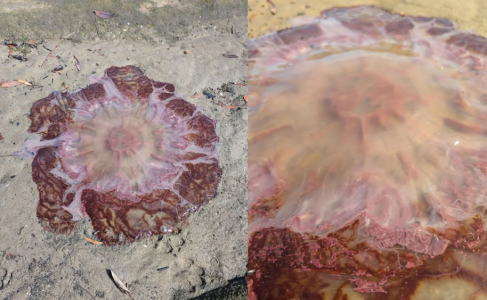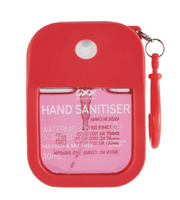Discover the shocking object that washed up on an Aussie beach – Authorities urge everyone to stay back!
By
Gian T
- Replies 0
Australia's beaches are renowned for their beauty and the occasional surprise from the deep blue, but a recent discovery at Rodd Point, in Sydney's inner west, has prompted a stark warning to both locals and tourists: keep your distance from the shoreline's latest visitor.
The object in question, a massive, disc-like creature with hues of pink and red, was identified by experts as a lion's mane jellyfish, one of the largest known jelly species in the world. The sight of this marine animal, known for its 'pretty venomous' nature, has caused quite a stir among the community, with one local woman taking to social media to caution others about the potential danger.
The lion's mane jellyfish is not just impressive in colour and size; its body, or bell, can grow to over a meter across, and its tentacles can trail for more than 10 meters. Marine biologist and jellyfish expert Lisa-ann Gershwin confirmed that the jellyfish found at Rodd Point is a mature adult, likely a remnant from the previous winter. As summer ends, most of these jellyfish die off, but not before they potentially wash ashore, as seen in this instance.
Gershwin, who couldn't determine the exact size of the jellyfish from photos due to the lack of a size reference, explained that the creature is definitely in its medusa stage, the adult phase of a jellyfish's life cycle. She also noted that while the jellyfish appeared 'rather flat,' this was likely due to it being stranded out of water, leaving it 'high and dry.'
The local woman's warning to 'keep your kids away' is well-founded. While lion's mane jellyfish stings are not fatal, they can deliver a painful sting that results in immediate burning, localised pain, itching, and irritated skin. Gershwin reassured that the pain is usually short-lived and without lasting effects but emphasised that all jellyfish are venomous and capable of injecting venom with incredible force.
In comparison to other jellyfish species, such as the notorious box jellyfish, the lion's mane found in Australian waters is less toxic and not known to cause scarring. However, Gershwin warned that the sting could still 'bring tears to your eyes,' especially in children with sensitive skin.
The best course of action if you encounter a lion's mane jellyfish, whether washed up on the beach or while swimming, is to leave it alone. The tide will often return these creatures to the sea. Gershwin strongly advised against poking them with sticks or any other form of interaction, as this could inadvertently lead to someone else, or a pet, getting stung.
For those unfortunate enough to experience a sting, the Australian Museum recommends applying a cold pack to alleviate the pain and seeking medical attention if necessary. Gershwin added that rinsing the sting with seawater is also advisable.
This incident serves as a reminder of the awe-inspiring and sometimes hazardous wildlife that inhabits Australia's coastal regions. As we marvel at the wonders of our environment, it's crucial to remember the importance of respecting wildlife and maintaining a safe distance for our protection and the creatures' well-being.
 Have you ever encountered a jellyfish or other marine life on your beach visits? Share your experiences and how you handled the situation in the comments below. Let's keep each other informed and safe while enjoying the natural beauty Australia has to offer!
Have you ever encountered a jellyfish or other marine life on your beach visits? Share your experiences and how you handled the situation in the comments below. Let's keep each other informed and safe while enjoying the natural beauty Australia has to offer!
The object in question, a massive, disc-like creature with hues of pink and red, was identified by experts as a lion's mane jellyfish, one of the largest known jelly species in the world. The sight of this marine animal, known for its 'pretty venomous' nature, has caused quite a stir among the community, with one local woman taking to social media to caution others about the potential danger.
The lion's mane jellyfish is not just impressive in colour and size; its body, or bell, can grow to over a meter across, and its tentacles can trail for more than 10 meters. Marine biologist and jellyfish expert Lisa-ann Gershwin confirmed that the jellyfish found at Rodd Point is a mature adult, likely a remnant from the previous winter. As summer ends, most of these jellyfish die off, but not before they potentially wash ashore, as seen in this instance.
Gershwin, who couldn't determine the exact size of the jellyfish from photos due to the lack of a size reference, explained that the creature is definitely in its medusa stage, the adult phase of a jellyfish's life cycle. She also noted that while the jellyfish appeared 'rather flat,' this was likely due to it being stranded out of water, leaving it 'high and dry.'
The local woman's warning to 'keep your kids away' is well-founded. While lion's mane jellyfish stings are not fatal, they can deliver a painful sting that results in immediate burning, localised pain, itching, and irritated skin. Gershwin reassured that the pain is usually short-lived and without lasting effects but emphasised that all jellyfish are venomous and capable of injecting venom with incredible force.
In comparison to other jellyfish species, such as the notorious box jellyfish, the lion's mane found in Australian waters is less toxic and not known to cause scarring. However, Gershwin warned that the sting could still 'bring tears to your eyes,' especially in children with sensitive skin.
The best course of action if you encounter a lion's mane jellyfish, whether washed up on the beach or while swimming, is to leave it alone. The tide will often return these creatures to the sea. Gershwin strongly advised against poking them with sticks or any other form of interaction, as this could inadvertently lead to someone else, or a pet, getting stung.
For those unfortunate enough to experience a sting, the Australian Museum recommends applying a cold pack to alleviate the pain and seeking medical attention if necessary. Gershwin added that rinsing the sting with seawater is also advisable.
This incident serves as a reminder of the awe-inspiring and sometimes hazardous wildlife that inhabits Australia's coastal regions. As we marvel at the wonders of our environment, it's crucial to remember the importance of respecting wildlife and maintaining a safe distance for our protection and the creatures' well-being.
Key Takeaways
- A giant lion's mane jellyfish was found washed up at Rodd Point, Sydney, prompting warnings to locals and tourists to keep away due to its painful sting.
- Marine biologist Lisa-ann Gershwin confirmed the jellyfish is mature and not uncommon to see during blooms where thousands can appear.
- While the lion's mane jellyfish sting is not fatal, it can cause immediate burning, pain, and sometimes itching and irritated skin without lasting scarring.
- Experts advise against interacting with the jellyfish and suggest that if stung, one should apply a cold pack and rinse with seawater, seeking medical attention if necessary.








